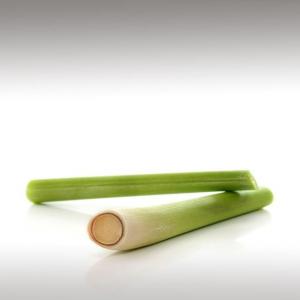
LEMONGRASS ESSENTIAL OIL (CYMBOPOGON CITRATUS) - ESSENTIAL OILS

BASE / GENERAL DATA
Information submited: May 5, 2014 Modified: March 15, 2018 By: OperaDreamhouse
Botanical Name: Cymbopogon citratus
Common Method of Extraction: Steam Distilled
Part Typically Used: Leaves
Color: Dark yellow to amber and reddish in color
Consistency: Slightly oily feeling
Perfumery Note: Middle
Strength of Initial Aroma: Lemony, sweet smell.
Cymbopogon Citratus, commonly known as lemon Grass or Oil Grass, is a tropical plant from Southeast Asia. It is a perennial fast-growing aromatic grass, growing to about 1 meter high with long, thin leaves and originally was growing wild in India. It produces a network of roots and rootlets that rapidly exhaust the soil.
Lemongrass oil is extracted from the fresh or partly dried leaves by steam distillation. This oil has a lemony, sweet smell and is dark yellow to amber and reddish in color, with a watery viscosity.
Chemical structure:
The main chemical components of lemongrass oil are myrcene, citronellal, geranyl acetate, nerol, geraniol, neral and traces of limonene and citral.

SPIRITUAL PRACTISES DATA

MEDICINE / HEALTH DATA
Information submited: June 13, 2014 Modified: February 19, 2018 By: OperaDreamhouse
The therapeutic properties of Lemongrass oil are analgesic, anti-depressant, antimicrobial. antipyretic, antiseptic, astringent, bactericidal, carminative, deodorant, diuretic, febrifuge, fungicidal, galactagogue, insecticidal, nervine, nervous system sedative and tonic.
Lemongrass oil has great benefits as a muscle and skin toner, and revitalizes the body and mind, helps with infections.
Lemongrass oil helps tone the muscles and tissue, relieves muscle pains by making the muscle more supple. It helps with correcting poor circulation and as an insect repellant. It is a great overall tonic for the body and it boosts the parasympathetic nervous system, which is a boon when recovering from illness, as it also stimulates glandular secretions.
Lemongrass contains 65-85% citral and active ingredients such as myrcene, an antibacterial and pain reliever.
In a small, randomised, controlled trial, an infusion made from Cymbopogon Citratus was used as an inexpensive remedy for the treatment of oral thrush in HIV / AIDS patients.
The study concluded that lemongrass essential oil may be the most effective essential oil against HSV-1 infection.
The essential oil of Cymbopogon Citratus works as an effective panacea against bacteria, flu and colds. In hot weather, this is the best oil to cool down the body temperature and to revive the mind and soul.
Citral demonstrated very good effectiveness and broad spectrum activity against Candida species. The study demonstrated that Lemongrass oil instead of citral can be used in pharmaceutical preparations for its antifungal activity.
Lemongrass mixed in salt and warm water can be effective in treating Trichophyton mentagrophytes (Tinea pedis).
This oil have at least a hypothetical potential to affect chronic conditions such as anxiety, depression, headaches or epilepsy, that do not respond well to conventional treatments.
This fragrant grass was used in the ancient cultures to normalize and ease symptoms of PMS.
Lemongrass has been used in medicine in India for more than 2000 years. It has been used for its carminative and anti-spasmodic activity. In India it is known as "Choomana Poolu" and is also referred to as "Indian Verben"' or "Indian Melissa oil" and used in Ayurvedic medicine to help bring down fevers and treat infectious illnesses.
Lemongrass is widely used in Asian cuisine for its citrus flavor. The tea from its leaves has been widely used as an antiseptic, febrifuge, antidyspeptic, carminative, tranquilizer and stomachic.
In Chinese medicine, lemongrass is indicated to dispel wind and free network vessels, warm center and relieve pain. Used for common cold with headache, diarrhea, wind-cold impediment pain, cold pain in stomach duct and abdomen, knocks and falls.
Cymbopogon Citratus has been used by the Brazilian Quilombolas tribe to decrease blood pressure and to calm individuals (anxiolytic). It is also used in Brazilian folk medicine in a tea called "Abafado" as a sedative, for gastrointestinal problems, and for fever. in Brazilian folk medicinethisoil is used for its hypnotic and anticonvulsant properties. This oil has been traditionally used to treat gastrointestinal discomforts.
Side effects:
Lemongrass oil can irritate a sensitive skin, so care should be taken. It should be avoided in pregnancy, due to it being a possible skin irritant. Not recommended during pregnancy or breastfeeding due to lack of sufficient human data.
Lemongrass may lower blood sugar levels. Caution is advised in patients with diabetes or hypoglycemia, and in those taking drugs, herbs, or supplements that affect blood sugar. Serum glucose levels may need to be monitored by a healthcare provider, and medication adjustments may be necessary.
Children: Avoid topical use on children under 2 years.
Lemongrass oil has great benefits as a muscle and skin toner, and revitalizes the body and mind, helps with infections.
Lemongrass oil helps tone the muscles and tissue, relieves muscle pains by making the muscle more supple. It helps with correcting poor circulation and as an insect repellant. It is a great overall tonic for the body and it boosts the parasympathetic nervous system, which is a boon when recovering from illness, as it also stimulates glandular secretions.
Lemongrass contains 65-85% citral and active ingredients such as myrcene, an antibacterial and pain reliever.
In a small, randomised, controlled trial, an infusion made from Cymbopogon Citratus was used as an inexpensive remedy for the treatment of oral thrush in HIV / AIDS patients.
The study concluded that lemongrass essential oil may be the most effective essential oil against HSV-1 infection.
The essential oil of Cymbopogon Citratus works as an effective panacea against bacteria, flu and colds. In hot weather, this is the best oil to cool down the body temperature and to revive the mind and soul.
Citral demonstrated very good effectiveness and broad spectrum activity against Candida species. The study demonstrated that Lemongrass oil instead of citral can be used in pharmaceutical preparations for its antifungal activity.
Lemongrass mixed in salt and warm water can be effective in treating Trichophyton mentagrophytes (Tinea pedis).
This oil have at least a hypothetical potential to affect chronic conditions such as anxiety, depression, headaches or epilepsy, that do not respond well to conventional treatments.
This fragrant grass was used in the ancient cultures to normalize and ease symptoms of PMS.
Lemongrass has been used in medicine in India for more than 2000 years. It has been used for its carminative and anti-spasmodic activity. In India it is known as "Choomana Poolu" and is also referred to as "Indian Verben"' or "Indian Melissa oil" and used in Ayurvedic medicine to help bring down fevers and treat infectious illnesses.
Lemongrass is widely used in Asian cuisine for its citrus flavor. The tea from its leaves has been widely used as an antiseptic, febrifuge, antidyspeptic, carminative, tranquilizer and stomachic.
In Chinese medicine, lemongrass is indicated to dispel wind and free network vessels, warm center and relieve pain. Used for common cold with headache, diarrhea, wind-cold impediment pain, cold pain in stomach duct and abdomen, knocks and falls.
Cymbopogon Citratus has been used by the Brazilian Quilombolas tribe to decrease blood pressure and to calm individuals (anxiolytic). It is also used in Brazilian folk medicine in a tea called "Abafado" as a sedative, for gastrointestinal problems, and for fever. in Brazilian folk medicinethisoil is used for its hypnotic and anticonvulsant properties. This oil has been traditionally used to treat gastrointestinal discomforts.
Side effects:
Lemongrass oil can irritate a sensitive skin, so care should be taken. It should be avoided in pregnancy, due to it being a possible skin irritant. Not recommended during pregnancy or breastfeeding due to lack of sufficient human data.
Lemongrass may lower blood sugar levels. Caution is advised in patients with diabetes or hypoglycemia, and in those taking drugs, herbs, or supplements that affect blood sugar. Serum glucose levels may need to be monitored by a healthcare provider, and medication adjustments may be necessary.
Children: Avoid topical use on children under 2 years.

BEAUTY / COSMETICS DATA

FOOD / COOKING DATA
Information submited: March 15, 2018 By: OperaDreamhouse
Lemongrass is used as a flavoring in many foods and is a favorite in Thai dishes. Lemongrass oil is using in food and flaver.
This oil is widely used in confectionary. Perfect for flavoring candy or chocolate.
A tea made with lemongrass is useful for fevers. Lemongrass oil very good appetite stimulant.
This oil is widely used in confectionary. Perfect for flavoring candy or chocolate.
A tea made with lemongrass is useful for fevers. Lemongrass oil very good appetite stimulant.
COMMENTS
No comments.


